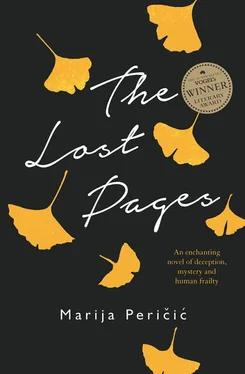As soon as we had arrived at Karlsbad I began to write letters to her, filling pages with questions and recriminations, with my own interpretations of looks she had given me, of phrases spoken. It became difficult to gather up the facts of the situation and I could no longer remember the exact nature of our relationship, how much of it was real and how much was lived only in my mind. I relived scene after scene of our days together, each time arriving at a different conclusion as to what was between us. Now I thought that she loved me; now that she barely saw me as a man. In the letters I was by turns abject in my sadness or crowing with accusations. Herr Liška came back to haunt me and I imagined him as a young Jan Žižka, still with both of his own eyes, austere and determined. I pictured encounters with him and plotted out what I would say to him if we chanced to meet. Of Franz too I was jealous. I remembered how she had looked that night on the stairs and how my mind had leaped immediately to Franz as an explanation. But I could not allow myself to dwell on that—I would have been driven mad—and I tried to I push all thoughts of him and Anja from my mind.
Although I wrote Anja letter after letter, I could never grasp the heart of what I wanted to say. Words are such imprecise tools, particularly words fixed in time and written black on white. Far better to expose one’s bare breast, to tear it open and display one’s heart, quivering; to show a naked eye, bathed in salt tears, or open late at night, dry and staring wakefully at the ceiling.
Of course I never sent Anja any of these letters. I screwed the pages into tight little balls and threw them away. Instead I sent her a few postcards and letters of the most conventional sort, recounting some amusing goings-on, or describing a local attraction as if in rehearsal for the travelogue. I never received any reply.
FRANZ, AFTER SOME WEEKS AT THE HOTEL, HAD BEGUN TO TIRE of the attention that came at him from all sides. The turning point came as a result of some encounters with a certain doctor who was also a visitor to Karlsbad. I first came across Dr Klopstock in the gardens of the Kurhaus bathhouse one afternoon, where we were sitting in adjacent chairs, he sunning himself and I making notes for the travelogue.
We fell into conversation, uneasily on my part. By this stage of our trip I had become somewhat wary of people attempting to use me as a means of getting close to Franz. But Klopstock seemed to be a perfectly ordinary man and did not strike me as one likely to be given to such obsessions. He was of early middle age and his neatly combed, uniformly grey hair was the only tidy thing about him. He slouched casually in his chair and both the suit he wore and the newspaper he held were comfortably rumpled and a little the worse for wear.
When I introduced myself he told me that he had read my first novel, but that he could not venture any opinion on it because he could not remember it. This comment cheered me immensely, suggesting a lack of interest in either literature or any flattery of me that might have made him a potentially troublesome acquaintance. At some point in the afternoon he mentioned quite calmly that he had heard that Franz was staying at the town, and that he thought he had glimpsed him at the baths but had not realised that I accompanied him. I explained about the travelogue and we then had a pleasant conversation about the baths and he recommended various sights in the region of Karlsbad that might interest us.
We spent an enjoyable few hours together, and as we were about to part the doctor invited me for dinner the following evening, together with Franz. The mention of Franz put me on my guard, but I accepted, after warning him that he may be dining alone with me if Franz was not able to attend.
The evening of the dinner came and, sure enough, Franz was nowhere to be found. I did not wait, but went to meet Dr Klopstock on my own. Relations between Franz and I were still rather strained and our conversation was still restricted to the practicalities of the travelogue. I was looking forward to the dinner; to have some conversation on subjects other than schedules, museum opening times and train timetables would be a welcome relief.
The meal was quite unremarkable and Dr Klopstock was an attentive host. He was not excessively disappointed that I appeared alone. I had a pleasant evening and then I promptly forgot the occasion. Over the next few days I did not see the doctor again at the bathhouse or around the town, and as I was busily touring the area and reviewing the sights he disappeared from my mind.
The following week I was hurriedly dressing in our little room one morning, taking advantage of Franz’s visit to the bathroom, when I was startled by a noise at the window. It sounded as though a bird were on the other side, tapping its beak against the glass. When I had put my shirt on, I drew back the curtains to look, but the window revealed nothing more than an early-morning spring sky with a few reluctant clouds. I opened the window and heard a shout from the lawn below. A man was standing there on the grass and waving his arms energetically over his head, apparently trying to get my attention.
He was shouting something over and over, and I thought at first that there had been some kind of accident and he was calling for assistance, but then I realised that it was my name he was calling. I had no idea who the man was.
Windows on the floors below ours were beginning to swing open and curious heads to emerge. Other windows were being angrily slammed shut against the noise of the man’s shouts. I noticed a group of porters in uniform running towards him across the lawn, accompanied by a small bald man. I gestured to the shouting man that I would come down.
When I reached him he was surrounded by a ring of the porters, and was silently fighting his way out of the grip of the bald man, who I now saw was wearing pyjamas. His face and scalp were still scored with vivid purple runnels from the imprint of the creases on his pillowcase. The shouting man was the tallest of the group, but was nevertheless impeded by the bald man, who had his arms wrapped entirely around him, pinioning his arms to his trunk and trying to throw him off balance like a professional wrestler.
I realised then that the shouting man was Dr Klopstock. He totally ignored the bald man clinging to his waist and casually hailed me as though we were simply meeting by chance in a café or on the street. He looked so dishevelled as to be unrecognisable. His hair was now like a cap of furze over his hollowed face and his clothing was covered in dirt.
‘Brod, I have been meaning to tell you that I have moved into your hotel. A room came up and I thought it would be good to be closer,’ he said, quite calmly.
The wrestle was still in progress, but Klopstock was managing to keep his voice on a remarkably even keel.
‘Do you and Franz fancy a morning walk? That’s what I wanted to ask you.’
My face must have communicated the disorientation I was feeling, because he indicated the bald man with a tilt of his chin, and said, ‘Oh, Jensen. You mustn’t bother about him.’
The bald man, Jensen, succeeded in pulling Klopstock to the ground. He lay there quite sedately, ignoring everyone and staring up at the sky. Another group of men had arrived, some fully dressed and some still in dressing-gowns. They huddled around the fallen Klopstock, blocking him from my view, and began discussing something in urgent tones. Occasionally one of them would turn and glare angrily at me and at the small knot of porters. I made my way back to our room.
Over the next days, Dr Klopstock came to be a regular feature in our lives. He tailed Franz with a ferocious tenacity that exceeded that of any other hotel guest. The apparent lack of interest he had shown in Franz in the beginning had given way to an all-consuming obsession. He seemed to spend all his time trying to get near to Franz and he seemed convinced that there existed between them some close relationship.
Читать дальше












